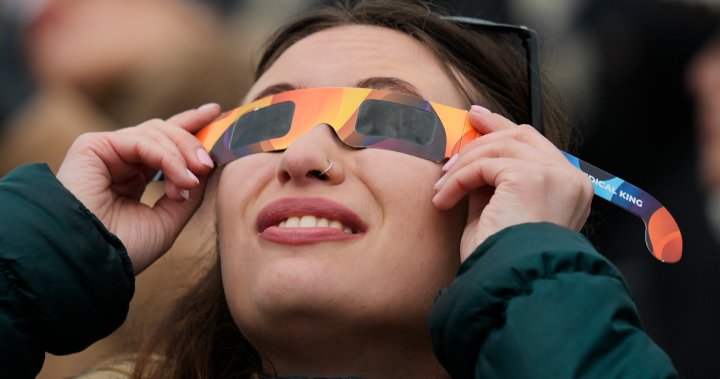Dozens of cases of eye damage related to April’s total solar eclipse have been reported so far in Canada.
The Ontario Association of Optometrists (OAO) told Global News on Thursday that it had received a total of 118 reports of eye complications from the April 8 eclipse.
The conditions reported in the province include inflammation of the cornea and solar retinopathy, which in extreme cases can cause permanent vision loss, said OAO president Josephine Pepe.
The reported cases ranged from Windsor to Ottawa and were not concentrated in any one part of Ontario, Pepe said in an emailed response.
“Many regions had significant cloud cover during the eclipse, and it seems as though most people heeded warnings and used proper eye protection when looking at the eclipse,” she said.
“We believe that both of these factors limited the number of cases of eye complications given that most of Ontario experienced some level of solar eclipse.”
Meanwhile, Quebec’s health department said that 43 cases of eye damage possibly related to the solar eclipse have been confirmed by optometrists, as of April 23.
These cases, which were confirmed by optometrists via an eclipse eye injury reporting form, included keratitis, solar retinopathy or keratoconjunctivitis sicca.
The latest health and medical news
emailed to you every Sunday.
“It is important to note that there may be an underestimation of cases, as the data collected by optometry clinics is voluntary, there may be a delay in reporting cases, and cases may not necessarily present to optometry clinics,” said Marie-Pierre Blier, a spokesperson for Quebec’s Ministry of Health and Social Services (MSSS).
This is the first time that the MSSS has set up a monitoring system for eye lesions related to a solar eclipse, Blier said.
She said the department is still studying the impact of the eclipse on emergency room visits.
On April 8, the solar eclipse’s path of totality passed through parts of Ontario, Quebec, New Brunswick, Prince Edward Island, Nova Scotia, and Newfoundland and Labrador.
Cities and towns that were outside the path of totality but nearby got to see a partial solar eclipse.
In Alberta, which witnessed a partial eclipse, a small number of emergency departments saw a slight increase in people presenting with “eye pain,” “re-check eye,” “red eye, discharge,” and/or “visual disturbance,” according to the province’s health ministry.
On April 8, there were seven cases at the Royal Alexandra Hospital in Edmonton and 11 cases at the Rockyview General Hospital in Calgary, said Andrea Smith, press secretary of Alberta’s health minister.
“It is not possible to know if this was due to the eclipse,” she said in an emailed statement to Global News.
The Canadian Association of Optometrists said it has received “very few” voluntary reports of patients with solar retinopathy from its members.
“However, we will keep monitoring the situation as time might still be necessary to get a comprehensive assessment of patients’ visits or calls related to the event,” the association told Global News on Thursday.
Global News reached out to the health departments and optometry associations of other provinces about eye damage reports related to the April 8 solar eclipse, but most did not have this data readily available or tracked and others did not respond by the time of publication.
In anticipation of the astronomical event, officials advised people to wear certified eclipse glasses to prevent eye damage when looking directly at the sun.
Looking at the sun directly during a solar eclipse or even otherwise without internationally certified glasses could potentially lead to eye damage that can be untreatable and at times, irreversible, experts say.
Solar retinopathy is the damage done to the retina, which is a tissue layer at the back of the eye responsible for vision, from looking directly at the sun or ultraviolet light.
In another condition called photokeratitis, which can be cured, the front of the eye becomes irritated from the sun’s UV light rays, said Mark Eltis, a Toronto-based optometrist in a previous interview with Global News.
Inflammation of the cornea, called keratitis, typically heals over the course of a few days, OAO’s Pepe said.
© 2024 Global News, a division of Corus Entertainment Inc.




